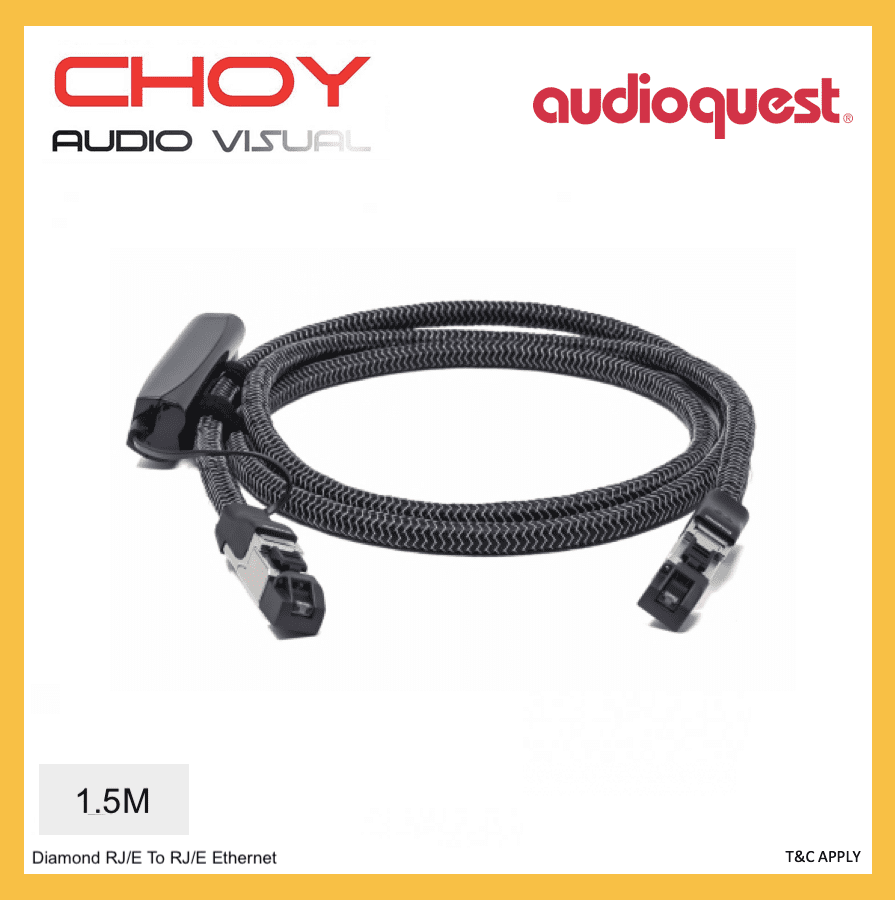Description
RJ/E Diamond prepared Cat 7 Ethernet cables use solid 100% Perfect-Surface Silver conductors, which completely eliminate strand interaction, one of the biggest sources of distortion in cables, for clearer, more dynamic and involving sound. Superior conductor metals minimize distortion by having fewer grain boundaries and less impurities (such as oxides) at those boundaries. Solid High-Density Polyethylene (PE) insulation helps maintain critical signal-pair geometry. Of course all AudioQuest Ethernet cables honor the directionality inherent in all analog and digital audio cables; arrows on the jackets indicate the direction (from source to destination) for the best audio performance.
Over the past several years there’s been a revolution in the way people store, distribute, and access digital media (in real time), including photos, movies, and, of course, music. No longer dependent on physical media, our media is often data that’s moved from multiple devices to multiple locations. For audio applications and protocols, audio over Ethernet offers the virtues of high-speed, low time delay (latency), significant distance capability (328 feet without an active booster or repeater), and extremely low-jitter, bit-perfect communication. Who wouldn’t want all of these things?
SOLID PERFECT-SURFACE SILVER (PSS) CONDUCTORS
Solid conductors prevent electrical and magnetic strand-interaction. PSS Solid-Silver minimizes distortion caused by grain boundaries and maximizes linear RF Noise-Dissipation.
CARBON-BASED 3-LAYER NOISE-DISSIPATION SYSTEM (NDS)
It’s easy to accomplish 100% shield coverage. Preventing captured Radio Frequency Interference (RFI) from modulating the equipment’s ground reference requires AQ’s Noise-Dissipation System (NDS). Traditional shield systems typically absorb and then drain noise/RF energy to component ground, modulating and distorting the critical “reference” ground plane, which in turn causes a distortion of the signal. NDS’s alternating layers of metal and carbon-loaded synthetics “shield the shield,” absorbing and reflecting most of this noise/RF energy before it reaches the layer attached to ground.
DIELECTRIC-BIAS SYSTEM WITH RADIO FREQUENCY TRAP
All insulation between two or more conductors is also a dielectric whose properties will affect the integrity of the signal. When the dielectric is unbiased, dielectric-involvement (absorption and non-linear release of energy) causes different amounts of time delay (phase shift) for different frequencies and energy levels, which is a real problem for very time-sensitive multi-octave audio. The inclusion of an RF Trap (developed for AudioQuest’s Niagara Series of power products), ensures that radio-frequency noise will not be induced into the signal conductors from the DBS field elements. (DBS, US Pat #s 7,126,055 & 7,872,195 B1)
GEOMETRY STABILIZING SOLID HIGH-DENSITY POLYETHYLENE INSULATION
PRECISION-MADE LOW-LOSS ULTRA-WIDE BANDWIDTH CONNECTORS WITH 100% SHIELD COVERAGE AND STRAIN RELIEF
HIGH-SPEED DATA CAPACITY
The Cat 7 cable standard has been created to allow 10-Gigabit Ethernet over 100 m of copper cabling.
ALL CONDUCTORS CONTROLLED FOR RF NOISE DIRECTIONALITY










